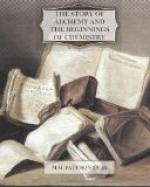The alchemists were sure that the intention of nature regarding metals was that they should become gold, for gold was considered to be the most perfect metal, and nature, they said, evidently strains after perfection. The alchemist found that metals were worn away, eaten through, broken, and finally caused to disappear, by many acid and acrid liquids which he prepared from mineral substances. But gold resisted the attacks of these liquids; it was not changed by heat, nor was it affected by sulphur, a substance which changed limpid, running mercury into an inert, black solid. Hence, gold was more perfect in the alchemical scale than any other metal.
Since gold was considered to be the most perfect metal, it was self-evident to the alchemical mind that nature must form gold slowly in the earth, must transmute gradually the inferior metals into gold.
“The only thing that distinguishes one metal from another,” writes an alchemist who went under the name of Philalethes, “is its degree of maturity, which is, of course, greatest in the most precious metals; the difference between gold and lead is not one of substance, but of digestion; in the baser metal the coction has not been such as to purge out its metallic impurities. If by any means this superfluous impure matter could be organically removed from the baser metals, they would become gold and silver. So miners tell us that lead has in many cases developed into silver in the bowels of the earth, and we contend that the same effect is produced in a much shorter time by means of our Art.”
Stories were told about the finding of gold in deserted mines which had been worked out long before; these stories were supposed to prove that gold was bred in the earth. The facts that pieces of silver were found in tin and lead mines, and gold was found in silver mines, were adduced as proofs that, as the author of The New Pearl of Great Price says, “Nature is continually at work changing other metals into gold, because, though in a certain sense they are complete in themselves, they have not yet reached the highest perfection of which they are capable, and to which nature has destined them.” What nature did in the earth man could accomplish in the workshop. For is not man the crown of the world, the masterpiece of nature, the flower of the universe; was he not given dominion over all things when the world was created?
In asserting that the baser metals could be transmuted into gold, and in attempting to effect this transmutation, the alchemist was not acting on a vague; haphazard surmise; he was pursuing a policy dictated by his conception of the order of nature; he was following the method which he conceived to be that used by nature herself. The transmutation of metals was part and parcel of a system of natural philosophy. If this transmutation were impossible, the alchemical scheme of things would be destroyed, the believer in the transmutation would be left without a sense of




